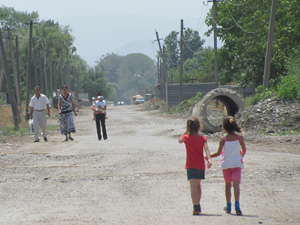Manon Bokuchava, Kvemo Kartli
“The biggest difference between ethnically Georgian and Azerbaijani women is that Georgians have more equal rights with their husbands than Azerbaijani women do. Generally, Azerbaijani women, basically in the villages, don’t feel free,” – says Tatiana Batashuri, who works in the office of “National Network against Violence.”
While talking about women’s rights, the human rights advocators recall ethnically Azerbaijani citizens in the first place. The biggest problem in this direction in the remote villages of the region is the arranged marriages of 13-14 years old girls and putting them in the unequal position with their husbands.
According to Tatiana Batashuri, ethnically Azerbaijani women often addressed their organization and talked about their problems in “third person”: “These women don’t say they are beaten by their husbands or can’t go out without their permission. They say that their relative or neighbor has this problem and they are asking us what to do.”
These kinds of problems are basically the problems of the women living in the villages. Most of them got married at the age of 13-14. They have not even graduated from school. For their basic needs, they need to ask their husbands or mother-in-laws for money.
Our conversation was attended by the official of the above mentioned organization: “If I were married, I don’t think I would have been able to work here. It’s hard to find a husband who lets you work in the office. Azerbaijanis let their wives work, basically in schools and hospitals.”
This situation is changing little by little in the city, but many villages are left in the same old path,” – states Galiba. She’s 21 years old and studies at Marneuli University Technical Branch. She says that she is lucky, as her parents are progressive thinkers. Nobody forced her to get married at the age of 14. Though, she has many friends who were kidnapped at this age.
“The kidnapping of under aged girls is common here. Police can’t really intervene, because, as a rule, the girl comes back home very seldom. Parents reconcile. The legal officers can’t intervene because they know, in case of an intervention, they’ll say that they are violating their traditions,” – says Tatiana Batashuri. According to her, because of this tendency, it is hard to find Azerbaijani girls in the upper grades of high school.
“Early marriages cause numerous health problems. I have a 29 year old friend, who got married at the age of 14. She had 27 abortions so far, this is 2 abortions a year. Do you know what this is? This is a loss of health,” – says Tatiana Batashuri.
This opinion is shared by Marneuli resident Sima Gajieva: “Many women don’t have an opportunity to get a spiral or they don’t know how to take the medication and take care of themselves. The result of this is numerous gynecological illnesses.”
Though we know many women in Kvemo Kartli who got married at the early age or were kidnapped, it proved hard to get their consent for the conversation. “Nothing happening in our families is insulting for us,” – said one of them.
We also met young Azerbaijani girls, who addressed the Marneuli office of “Network against Violence.” “We want to graduate from the high school and go to college. Please, help us to assure our parents,” – requested Azerbaijani girls.
The Ministry of Reintegration Issues talks about the fact that the new generation of Azerbaijani girls are trying to receive good education and develop their abilities.
Zaira Musaeva, the chief specialist of the Department of Ethnical Minority Issues of the Ministry of Reintegration: “I’m glad that more and more Azerbaijani girls are entering the higher education institutions. They often come to Tbilisi, observe this life and want to live like this. But there are other problems. To say it broadly, the state politics regarding ethnic minorities is redirected to the integration issue. But apart from this, we have a lot of problems to solve. Unfortunately, there are villages with ethnical Azerbaijanis left where women still give birth in their homes. We are involved in the work of a special commission to which we will report the recommendations of the Ministry of Health and the Ministry of Education.’’
The ethnically Azerbaijani Zaira Musaeva says that in her huge family, only she and her sister have received higher education.
It’s really noticeable how the lives of the Azerbaijani women from Kvemo Kartli have changed. Though, there are still many families where the only purpose for women is giving birth and bringing up their kids.
News
December 13, 2023
Ethnic minorities outside the peace dialogue
November 6, 2023
‘Peace’ agenda of political parties
Popular
Articles
February 13, 2024




